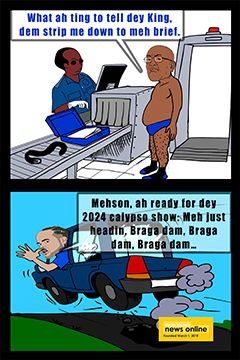Divide and rule in the Virgin Islands
A series of stories looks at the Virgin Islands political scene as midterm approaches: What is the political pulse of the country approximately two and a half years before another general election season begins? This narrative looks at the increasingly divisive tone in Virgin Islands politics. It also states that the politics of demographics applies as much to the Virgin Islands’ political model, as it does to the USA’s. Politics in the Virgin Islands may have gone tribal.
This Observer of Virgin Islands politics was listening to the radio programme, and live meeting of the country’s House of Assembly, ‘’LEGCO,’’ the evening of April 30, 2013. He heard a very promising, young legislator, and Government backbencher, chide an element in these Lesser Antilles who appear to be playing to the LOWEST COMMON DENOMINATOR in the game called politics.
The denominator is called DIVIDE AND RULE. The them versus us paradigm. This is a very old political idea: as old as politics itself. It is the idea of divide and conquer: something most empires, from the Romans to the British, were very adept at. In the Virgin Islands, it spells dividing Virgin Islanders into various groupings for clearly political purposes.
There are three clearly discernible groups of voters in these islands, that a divide and rule politics can easily gauge. They can be described by alluding to their nationality and family backgrounds. First is the generational Virgin Islander: Virgin Islanders who are citizens by ancestry going back a couple or more generations. This still appears to be the largest voter group. Then second, there are the born here Virgin Islanders : these are Virgin Islanders born in the Virgin Islands but having both parents expatriate or naturalized citizens. Finally, and third, there are those voters who gained status through either marriage, length of stay, or simple political favouritism: or through a combination of some or all of these factors.
There is furthermore a geographic demographic in the Virgin Islands: certain parts of the island that habitually vote one way or another. This may simply be a product of history, but it is a very real demographic. Certain districts are strong supporters of one or the other party. Thankfully, ethnic and racial demographics do not appear to play a major part in Virgin Islands politics, as is the case with the USA, and the UK. This is probably due to the fact that in the Caribbean, nuances of race, although very present, do not play that great a factor in politics as do social nuance, class, tradition and custom.
Then there are the sub demographics. These are smaller voter groups. In a tiny country such as these Lesser Antilles, the Church, Public Service, and social groups, such as those members of certain well known fraternities and clubs, may be considered sub demographics. Another may be the building and construction industry. Businessmen and women, corporate executives, and self employed persons, are also a sub demographic, not as cohesive as previously mentioned groups, but a demographic nevertheless. Even members of the educational and sporting establishments may be considered a sub demographic.
One core feature of a demographic in politics is this one: it has to be a group with enough voter mass to affect the political trajectory at election time. A demographic may also be prone to the herd instinct: that is, a majority of persons in the demographic from time to time will vote the same way. This springs from a primal instinct for survival and self interest.
Now, the Virgin Islands is a very tiny country indeed, and it is a community with a history of close knit community. However, that village type dynamic is clearly being taken apart brick by brick. This breakdown of a precious value system began with the advent of great prosperity brought about by the financial services and tourism economy.
Community adhesion is further being pulled apart by mass migration, with various cultures and ethnicities arriving on Virgin shores. The agrarian economy pre the financial services boom was based upon a type of social bartering. This was a modus Vivendi that helped sew a fabric of unity into post slavery society. In the 1940s, 50s, 60s, 70s and early 80s, the country possessed a social model molded together by religion, agriculture, and a strong family and village network.
Today, a divisive politics is certainly not helping foster that strong community nurtured by generations of forebears. Divisive politics is a wolf that has been unleashed in a community of sheep: people of these Lesser Antilles possess a history of civility, courtesy, urbanity, and old world charm and tradition.
This April 2013, a number of politicians and their cohorts in the media appear to be playing an excellent game of political strategy, using an aggressive media dynamic. And it is copied straight out of the USA playbook: the POLITICS OF DEMOGRAPHY. The reader may say this is a farfetched assertion. But it is not. The politics of demography emphasizes ethnic, economic, and social differences in the voting population and when effectively utilized energizes base supporters.
And just like the US election of November 2012, the stronger the base of support the greater the likelihood of victory at an election. The base of support is made up of traditional voters of a one party or the other, belonging to one or more of the demographics named in this article. Getting the base out to the ballot box on Election Day is a modus Vivendi of the successful political party.
In the USA, that country’s swiftly changing demographic is characterized by advancing Latina power, and a clear Liberal backlash against conservatism and fundamentalism. Demography is replacing economics as the determinant of political success. It used to be said: ‘’ it is the economy stupid!’’ Today, that may have changed to:’’ it is demography silly!’’
In the USA, both political parties today pander to a strongly growing Latina population dynamic. The days of absolute White Anglo Saxon Protestant, or WASP control of the White House are over for good. The Senate and Congress will also change demographically in coming years with many more Spanish American Senators and Congressmen joining a very exclusive club. Yes, global trends don’t just affect economics and finance, but in politics too, countries tend to follow a playbook straight from the pages of the more mature democracies, especially the US, Canada, Europe.
Using the US as an analogy is useful. Why? It is the largest democracy in the Hemisphere. Now Virgin Islands politicians may not appear to know this, but local politicians and their foot soldiers in the media and elsewhere are playing demographic politics. How are they doing this? By using their media clout, and playing to some very basic nationalist sentiments to arouse their natural supporters.
The current narrative is one that states that the Indigenous Virgin Islander is under threat. Therefore, a certain political party is the best bet if Virgin Islanders want to be put first in the eternal struggle for resources and power in their country. And notwithstanding whether or not the party has the policies required to pull this country into the 21st century. Will it work as a strategy? So far it appears to be working, if one assesses the soundings from the all powerful grapevine, backstreets, and backwaters, add chit chat in various locations, and informal gatherings, here and there.
But returning to the USA where both parties played this game at the November 2012 Presidential Election, the Republicans began the play with the creation of the Tea Party, add a racial tone in their attacks on an allegedly foreign born president with a very un-American name, and so on and so forth. This was a narrative driven by right wing media cohorts: Rush Limbaugh, Glen beck, Bill O’Reilly, Ann Coulter, and so on. It was a play to the white voter, especially those with fundamentalist or conservative sentiments, typified by Southern whites with a feeling of insecurity over a swiftly changing face of the USA in terms of the racial mural.
However, divide and rule based on race backfired badly. A new politics of demography actually worked better for the Democratic Party. Latinas, Asians, gays, single women, and white liberals, voted overwhelmingly Democrat. These were voters who became very weary of Republican Right Wing motives. Racial politics actually motivated minorities and liberals to get out and vote, more than it did Southern whites and conservatives. Whether a wealthy and robotic candidate had anything to do with the Republican defeat is another subject for study.
On the Republican side, getting blue collar, evangelical, and mainstream whites to the ballot box also succeeded. But not enough to win a general election with demographics as key factor in victory.
And the same could happen here in the Virgin Islands: be careful with DIVIDE and RULE: it may not quite work out as some may think.
To be continued
Connect with Dickson Igwe on TWITTER and FACEBOOK










.png)
.png)



.png)






















3 Responses to “Divide and rule in the Virgin Islands”
Nail on the head, although sad to say, Mark (blogger above) is correct that the 4th group of voters is possibly the most powerful in this wild west country.
It's a dangerous game you politicians and media are playing and we all need to watch out for it if we want a peaceful, prosperous future in these islands.